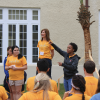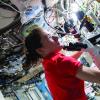2024-25
 “The Tender Hand of the Unseen,” an immersive video installation that was featured on the Daniels and Fisher Tower in downtown Denver, was the work of Molly Valentine Dierks, a Department of Art and Art History assistant teaching professor who is also a sculptor, interdisciplinary artist and self-described “nature geek.”
“The Tender Hand of the Unseen,” an immersive video installation that was featured on the Daniels and Fisher Tower in downtown Denver, was the work of Molly Valentine Dierks, a Department of Art and Art History assistant teaching professor who is also a sculptor, interdisciplinary artist and self-described “nature geek.” Lori Peek, director of CU Boulder’s Natural Hazards Center and professor of sociology, has spent years studying the long-term effects of disasters like Hurricane Katrina and the Deepwater Horizon oil spill on Gulf Coast communities.
Lori Peek, director of CU Boulder’s Natural Hazards Center and professor of sociology, has spent years studying the long-term effects of disasters like Hurricane Katrina and the Deepwater Horizon oil spill on Gulf Coast communities. The newly established Center for Healthy Mind and Mood at CU Boulder is pioneering a transformative approach to understand depression and promote healthy mood in young people.
The newly established Center for Healthy Mind and Mood at CU Boulder is pioneering a transformative approach to understand depression and promote healthy mood in young people. Studying information science helped Shamika Klassen bring her experience as a technology chaplain and her interest in technowomanism together in ways that encouraged her to ask questions about how technology could work better for people.
Studying information science helped Shamika Klassen bring her experience as a technology chaplain and her interest in technowomanism together in ways that encouraged her to ask questions about how technology could work better for people. Books like The Secret Garden and A Little Princess by British author Frances Hodgson Burnett continue to be fan favorites for young children. That’s because children in books like these are empowered to figure things out for themselves and exist in worlds that are magical.
Books like The Secret Garden and A Little Princess by British author Frances Hodgson Burnett continue to be fan favorites for young children. That’s because children in books like these are empowered to figure things out for themselves and exist in worlds that are magical. Founded by a collective of CU Boulder scholars, artists, educators and community organizers, the Lyripeutics Storytelling Project's mission is to empower Black and brown youth through a medium many connect with—hip hop.
Founded by a collective of CU Boulder scholars, artists, educators and community organizers, the Lyripeutics Storytelling Project's mission is to empower Black and brown youth through a medium many connect with—hip hop. For Melanie Yazzie, professor of art practices and head of printmaking in the Department of Art and Art History at CU Boulder, art and transformation are intrinsically connected.
For Melanie Yazzie, professor of art practices and head of printmaking in the Department of Art and Art History at CU Boulder, art and transformation are intrinsically connected. BioServe, which was founded in 1987, works with scientists at companies and research institutions around the world to conduct life science experiments in space.
BioServe, which was founded in 1987, works with scientists at companies and research institutions around the world to conduct life science experiments in space. CU Boulder established the Colorado Space Policy Center (CSPC) this year to explore this evolving landscape and study the present and future of space exploration, including research and development efforts and emerging policy issues.
CU Boulder established the Colorado Space Policy Center (CSPC) this year to explore this evolving landscape and study the present and future of space exploration, including research and development efforts and emerging policy issues. CU Boulder is leading the development of secure and resilient solutions for the Spaceborne Low Energy AI Computing project, which aims to bring energy-efficient artificial intelligence to satellites, enabling real-time data analysis and reducing reliance on Earth-based systems.
CU Boulder is leading the development of secure and resilient solutions for the Spaceborne Low Energy AI Computing project, which aims to bring energy-efficient artificial intelligence to satellites, enabling real-time data analysis and reducing reliance on Earth-based systems.

